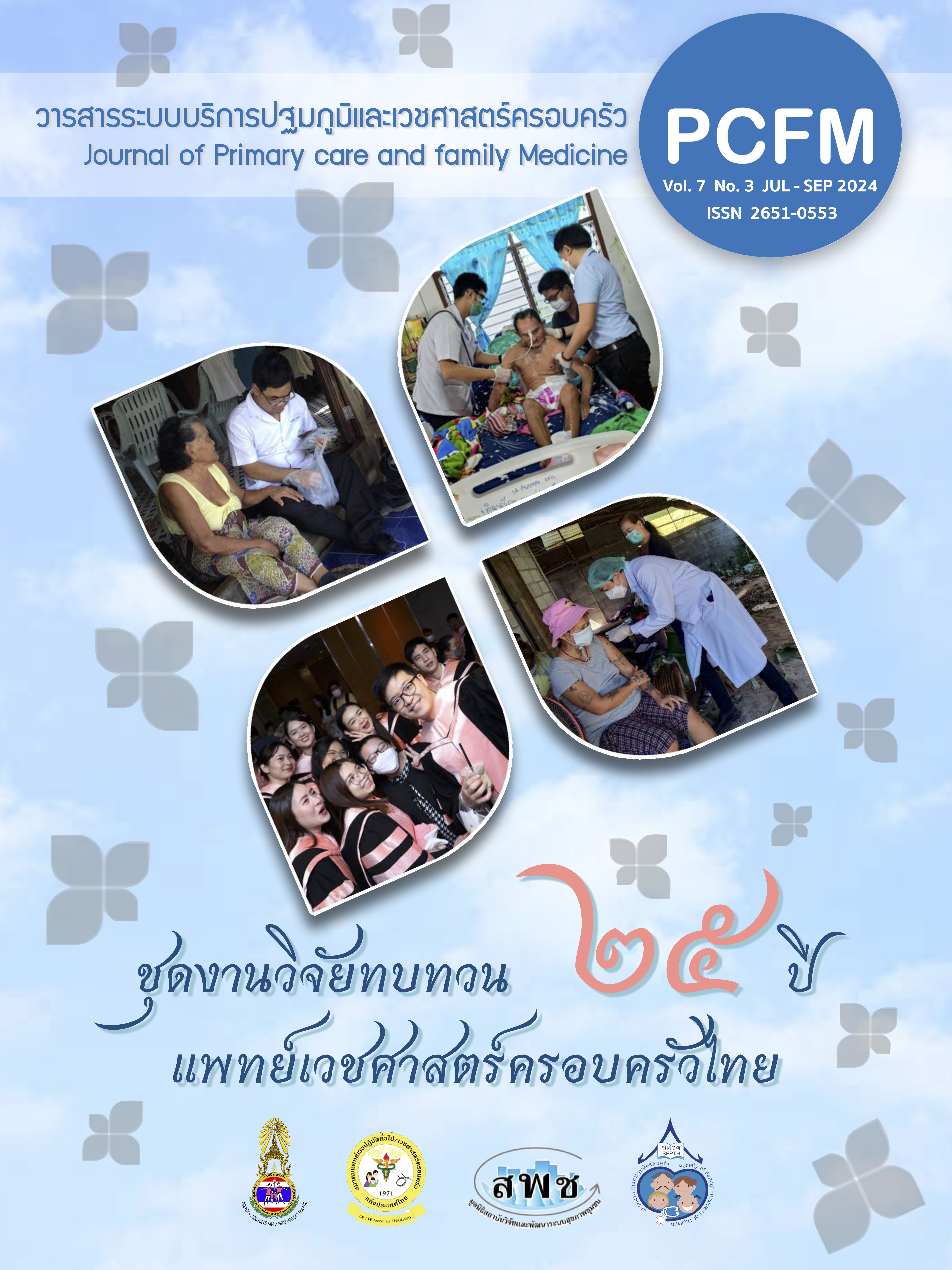25 ปี วิวัฒนาการหลักสูตรการฝึกอบรมแพทย์ประจำบ้านสาขาเวชศาสตร์ครอบครัว ประเทศไทย : การศึกษาเชิงคุณภาพ
Main Article Content
บทคัดย่อ
ที่มา: หลักสูตรฝึกอบรมแพทย์ประจำบ้านสาขาเวชศาสตร์ครอบครัวในประเทศไทยก่อตั้งขึ้นใน พ.ศ. 2541 เริ่มต้นจากที่มีผู้เข้ารับการฝึกอบรมและสถาบันฝึกอบรมจำนวนไม่มาก จนกระทั่งปัจจุบันมีการขยายวงกว้างไปทั่วประเทศ มีผู้เข้ารับการฝึกและสถาบันการฝึกอบรมเพิ่มขึ้น การศึกษานี้มีวัตถุประสงค์เพื่อศึกษาวิวัฒนาการของหลักสูตรฝึกอบรมแพทย์ประจำบ้านสาขาเวชศาสตร์ครอบครัวในประเทศไทยตั้งแต่เริ่มก่อตั้งจนถึงปัจจุบัน
วัสดุและวิธีการ: การวิจัยเชิงคุณภาพดำเนินการโดยใช้การสัมภาษณ์เชิงลึก การสนทนากลุ่ม และแบบสอบถามกึ่งโครงสร้างออนไลน์ ผู้เข้าร่วมเป็นบุคคลที่มีประสบการณ์อยู่ในแวดวงเวชศาสตร์ครอบครัวจำนวน 31 คน โมเดลการพัฒนาหลักสูตรของ Kern ถูกใช้เพื่อวิเคราะห์และทบทวนวิวัฒนาการ มีทั้งหมด 6 ขั้นตอน ได้แก่ 1) ระบุปัญหาและประเมินความต้องการทั่วไป 2) ประเมินความต้องการของกลุ่มผู้เรียน 3) เป้าหมายและวัตถุประสงค์จำเพาะ 4) กลยุทธ์ในการจัดการศึกษา 5) การนำหลักสูตรไปใช้ 6) ประเมินผลและฟีดแบ็ก ข้อมูลเชิงคุณภาพถูกรวบรวมและวิเคราะห์โดยการวิเคราะห์เนื้อหา
ผลการศึกษา: วิวัฒนาการของหลักสูตรฝึกอบรมแพทย์ประจำบ้านเวชศาสตร์ครอบครัวในประเทศไทยตลอด 25 ปีที่ผ่านมา สามารถแบ่งออกได้เป็น 3 ยุคดังนี้ 1) ยุคการก่อตั้ง 2) ยุคการขยายจำนวน และ 3) ยุคการรับรองคุณภาพ ยุคที่ 1 (พ.ศ. 2541 - 2551) เป็นยุคเริ่มต้นและมีการเติบโตอย่างรวดเร็วของจำนวนผู้เข้ารับการฝึกอบรม ยุคที่ 2 (พ.ศ. 2552-2561) เป็นยุคแห่งการเพิ่มจำนวนสถาบันฝึกอบรมและศักยภาพในการฝึกอบรม ยุคที่ 3 (พ.ศ. 2562-ปัจจุบัน) เป็นยุคที่มีการนำเกณฑ์ของสหพันธ์การแพทย์โลกมาใช้ในการประกันคุณภาพ ปัจจัยที่มีอิทธิพลต่อวิวัฒนาการของการพัฒนาหลักสูตร ได้แก่ นโยบายการปฏิรูประบบสุขภาพ ความต้องการด้านสุขภาพขั้นพื้นฐานของประชากร แนวโน้มแพทยศาสตรศึกษาทั่วโลก ระบบประกันคุณภาพการศึกษา และความต่อเนื่องของการพัฒนาอาจารย์ ส่วนอุปสรรคของการพัฒนา ได้แก่ การประเมินความต้องการของผู้เรียนเป้าหมายอาจยังมีไม่เพียงพอ อัตลักษณ์วิชาชีพยังไม่ชัดเจนในภาพสาธารณะ และระบบสนับสนุนการฝึกอบรมไม่เพียงพอ
สรุป: เพื่อให้บรรลุศักยภาพสูงสุดในการผลิตแพทย์เวชศาสตร์ครอบครัว เป้าหมายการฝึกอบรมและวัตถุประสงค์จำเพาะในการฝึกอบรมควรตั้งให้สอดคล้องตามความต้องการของกลุ่มผู้เรียนเป้าหมาย โดยเป้าหมายควรเชื่อมโยงกับความต้องการของสังคม รวมถึงมีระบบสนับสนุนการฝึกอบรมที่เพียงพอ คำนึงถึงศักยภาพการฝึกอบรมในระบบสุขภาพของประเทศ
คำสำคัญ: การศึกษาเชิงคุณภาพ การพัฒนาหลักสูตร การฝึกอบรมแพทย์ประจำบ้าน เวชศาสตร์ครอบครัว ประเทศไทย
Article Details

อนุญาตภายใต้เงื่อนไข Creative Commons Attribution-NonCommercial-NoDerivatives 4.0 International License.
เนื้อหาและข้อมูลในบทความที่ลงตีพิมพ์ในวารสาร PCFM ถือเป็นข้อคิดเห็นและความรับผิดชอบของผู้เขียนบทความโดยตรง ซึ่งกองบรรณาธิการวารสารไม่จำเป็นต้องเห็นด้วยหรือร่วมรับผิดชอบใด ๆ
บทความ ข้อมูล เนื้อหา รูปภาพ ฯลฯ ที่ได้รับการตีพิมพ์ลงในวารสาร PCFM ถือเป็นลิขสิทธิ์ของวารสาร PCFM หากบุคคลหรือหน่วยงานใดต้องการนำทั้งหมดหรือส่วนหนึ่งส่วนใดไปเผยแพร่ต่อหรือเพื่อกระทำการใด ๆ จะต้องได้รับอนุญาตเป็นลายลักษณ์อักษรจากวารสาร PCFM ก่อนเท่านั้น
เอกสารอ้างอิง
Royal College of Family Physician Thailand. Thai FM database [Internet]. 2023 [cited 20 Aug 2024]. Available from: https://database.thaifammed.org/thai_family_physicians.php?q=&zone=1
AlSharief WM, Abdulrahman M, Khansaheb HH, Abdulghafoor SA, Ahmed A. Evolution of family medicine residency training program in Dubai Health Authority: A 24-year review, challenges, and outcomes. J Family Med Prim Care. 2018;7:425-9.
Thomas PA, Kern DE, Hughes MT, Chen BY. Curriculum Development for Medical Education: A Six-Step Approach. 3rd ed. Baltimore, MD: The Johns Hopkins University Press; 2015..
Thailand Health Care Reform Project Final report. [Internet]. 2021 [cited 2024 Aug 20] Available from: https://eng.nhso.go.th/view/1/hcr_Phase1/EN-US
World Federation for Medical Education (WFME). Basic Medical Education WFME Global Standards for Quality Improvement: The 2020 Revision. 2023 [Interrnet]. [cited 20 Aug 2024] Available from: https://wfme.org/wp-content/uploads/2020/12/WFME-BME-Standards-2020.pdf
Institute for Medical Education Accreditation (IMEAc) [Internet]. 2021 [cited 2024 Aug 20]. Available from: https://imeac.org/
Royal College of Family Physician Thailand. Curriculum and Training handbook for Thai Family Medicine Diploma Vol. 1: RCFPT. Bangkok: College of Family Physician of Thailand, 1998.
Royal College of Family Physician Thailand. Curriculum and Training handbook for Thai Family Medicine Diploma Vol. 2: RCFPT. Bangkok: College of Family Physician of Thailand, 2005.
Royal College of Family Physician Thailand. Curriculum and Training handbook for Thai Family Medicine Diploma Vol. 3: RCFPT. Bangkok: College of Family Physician of Thailand, 2012.
Royal College of Family Physician Thailand. Curriculum and Training handbook for Thai Family Medicine Diploma Vol. 4: RCFPT. Bangkok: College of Family Physician of Thailand, 2018.
Royal College of Family Physician Thailand. Education Qualification for Curriculum Thai Family Medicine Diploma Vol. 5: RCFPT. Bangkok: College of Family Physician of Thailand, 2019.
Royal College of Family Physician Thailand. Education Qualification for Curriculum Thai Family Medicine Diploma Vol. 5: RCFPT. Bangkok: College of Family Physician of Thailand, 2022.
Frank JR, Snell LS, Cate OT, Holmboe ES, Carraccio C, Swing SR, Harris P, Glasgow NJ, Campbell C, Dath D, Harden RM. Competency-based medical education: theory to practice. Medical teacher 2010;32:638-45.
Fowler N, Lemire F, Oandasan I, Wyman R. The Evolution of Residency Training in Family Medicine: A Canadian Perspective. Fam Med. 2021;53:595-8.
Frenk J, Chen L, Bhutta ZA, Cohen J, Crisp N, Evans T, et al. Health professionals for a new century: transforming education to strengthen health systems in an interdependent world. The Lancet 2010;376(9756):1923-58.
Tangcharoensathien V, Witthayapipopsakul W, Panichkriangkrai W, Patcharanarumol W, Mills A. Health systems development in Thailand: a solid platform for successful implementation of universal health coverage. The Lancet. 2018;391(10126):1205-23.
Strasser R, Worley P, Cristobal F, Marsh DC, Berry S, Strasser S, Ellaway R. Putting communities in the driver’s seat: the realities of community-engaged medical education. Acad Med. 2015;90:1466-70.
World Health Organization. Transforming and scaling up health professionals’ education and training: World Health Organization guidelines 2013. Geneva: World Health Organization, 2013.
Steinert Y, Mann K, Anderson B, Barnett BM, Centeno A, Naismith L, Prideaux D, Spencer J, Tullo E, Viggiano T, Ward H, Dolmans D. A systematic review of faculty development initiatives designed to enhance teaching effectiveness: A 10-year update: BEME Guide No. 40. Med Teach. 2016 Aug;38(8):769-86.
Leslie K, Baker L, Egan-Lee E, Esdaile M, Reeves S. Advancing faculty development in medical education: a systematic review. Acad Med. 2013;88:1038-45.
McLean M, Cilliers F, Van Wyk JM. Faculty development: yesterday, today and tomorrow. Med Teach. 2008;30:555-84.
Wilkerson L, Irby DM. Strategies for improving teaching practices: a comprehensive approach to faculty development. Acad Med. 1998;73:387-96. do.
Steinert Y. Faculty development in the health professions: a focus on research and practice. Dordrecht: Springer: 2014.
Johnson JK, Miller SH, Horowitz SD. Systems-Based Practice: Improving the Safety and Quality of Patient Care by Recognizing and Improving the Systems in Which We Work. In: Henriksen K, Battles JB, Keyes MA, Grady ML, editors. Advances in Patient Safety: New Directions and Alternative Approaches (Vol. 2: Culture and Redesign). Rockville (MD): Agency for Healthcare Research and Quality (US); 2008 Aug. PMID: 21249914.
Gonzalo JD, Haidet P, Papp KK, Wolpaw DR, Moser E, Wittenstein RD, Wolpaw T. Educating for the 21st-Century Health Care System: An Interdependent Framework of Basic, Clinical, and Systems Sciences. Acad Med. 2017;92:35-39.


